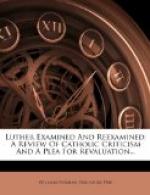Lastly, this homicide Hans Luther, eight years after coming to Mansfeld, is elected by his fellow-townsmen one of the “Vierherren,” or aldermen, of the town. Only most trusted and well-reputed persons were given such an office. A homicide would not have been allowed to settle at Mansfeld, much less to govern the town. Any rogue in the town that he had to discipline in his time of office would have thrown his bloody record up to him.
A Catholic writer says: “The wild passion of anger was an unextinguished and unmodified heritage transmitted congenitally to the whole Luther family, and this to such an extent that the Lutherzorn (Luther rage) has attained the currency of a German colloquialism.” Mr. Mayhew thinks that “Martin was a veritable chip of the hard old block,” the “high-mettled foal cast by a fiery blood-horse.” Catholic writers cite Mr. Mayhew as a distinguished Protestant. If you have not heard of him before, look him up in Who is Who? most anywhere.
All this, however, is a desperate attempt to find proof against an assumed criminal by circumstantial evidence. No direct evidence has ever been available to implicate Luther’s father in a village brawl. As to the Lutherzorn, Luther has in scores of places explained the real reason of it: Luther did not inherit, but Rome roused it. This Lutherzorn may arise in any person that is not remotely related to the Luthers after reading Catholic biographies of Martin Luther.
7. Luther’s Great Mistake.
Catholic writers contend that Luther made a mistake when he became monk. Protestants share this view, but put the emphasis in the sentence: Luther became a monk, at a different place. In the Protestant view the mistake is this, that Luther became a monk, in the Catholic view, it is this, that Luther became a monk. Protestants regard monasticism largely as a perversion of the laws of nature and of Christian morals. In an institution of this kind Luther could not find the relief he sought. His mistake was that he sought it there. Catholics view monkery as the highest ideal of the Christian life, and blame Luther for entering this mode of life when he was altogether unfit for it. They regard Luther as guilty of sacrilege far seeking admission into the order of Augustinian friars. When he was permitted to turn monk, that which is holy was given unto a dog, and pearls were cast before a swine.
Catholics argue that Luther’s cheerless boyhood, the poverty of his parents, the hard work and close economy that was the order in the home at Mansfeld, the harsh and cruel treatment which Luther received from parents that were given to “fits of uncontrollable rage” induced in Luther a morose, sullen spirit. He became brooding and stubborn when yet a child. He was a most unruly boy at school. His character was not improved when he was sent abroad for his education and had to sing for his bread or beg in the streets.




